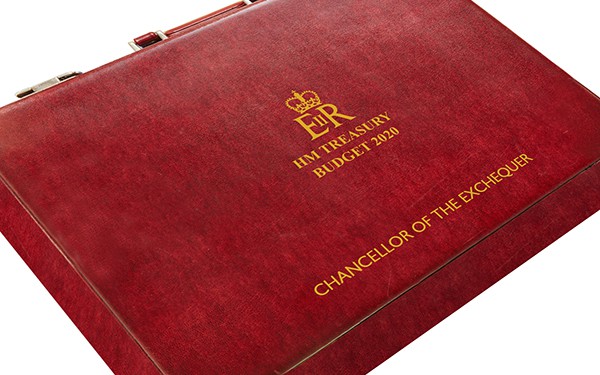
What does the 2020 Budget look like for freelancers and contractors?
Posted on 17th March 2020 by Phil Ainley
Amidst the extensive details of increased borrowing and the improved investment into the UK’s economy and improving its infrastructure, there was little mention of the rollout of IR35 reform to the private sector and how it would affect the freelance contractor community and the economy as a whole.
The usual list of cuts or increases to National insurance Contributions, and Pensions, and the increased investment for infrastructure, bear little relevance to the freelance community.
What is relevant and is constantly on the worried minds of the self-employed is their taxes, and more importantly how much more they are going to have to pay to be more in line with those taxes paid by employees.
Contractors and freelancers likely to pay more tax
IR35 was not mentioned in Chancellor, Rishi Sunak’s hour-long speech, but the full budget document states on P88 Point 2.1781, that IR35 would go ahead on April 6th, as previously announced.
The Government did state that it would make a number of changes to support IR35’s smooth and successful implementation.
Yet, many self-employed workers have expressed concerns that businesses will find the changes too complicated and as a result the contractors themselves will be the ones to suffer through increased tax bills and potential fines relevant to previous contractual engagements.
Not all self-employed professionals are affected
Sole traders are freelance professionals who run their own business as an individual and are personally responsible for the losses their business makes. Because they do not operate through a limited company structure, they are unaffected by the upcoming private sector IR35 reforms, as sole traders are exempt.
The bigger picture
In IPSE’s last quarterly Freelancer Confidence Index2, they saw the lowest business confidence on record. This aligned with the UK economy flatlining at 0.0% growth in the three months to January 2020 was attributed almost entirely to the impending April IR35 changes. There have been some plus points, but not many.
Tax stability
The amount you can earn before paying 20% income tax will be frozen at £12,500, while the threshold for the higher 40% rate of income tax remains at £50,000.
The budget delivers on the Conservatives’ promise to cut tax for some 31 million working people. The increase in the National Insurance Contributions threshold for employees, and Lower Profits Limit for the self-employed, to £9,500 from April 2020, will save the self-employed person £78.00 on average in 2020-21.
Corporation tax remained at 19%, plus there were no rises in the rates of income tax, VAT or National Insurance. Fuel duty was also frozen, which is also good news, but will the freeze be reflected at the pumps?
Immediate benefit regarding Coronavirus
The self-employed are not entitled to sick pay yet make up nearly 5 million people working in the UK across various sectors. Thankfully the budget did make some contingency for the self-employed in light for the COVID-19 pandemic.
The first benefit for self-employed workers in the Budget is that they will be able to claim Employment and Support Allowance (ESA) from day one of illness rather than day eight.
ESA is paid to those people who are too sick to work, providing they meet certain conditions. It is worth £73.10 per week, or £57.90 for the under-25s.
The Government’s temporary removal of the income floor from universal credit means people will be able to claim for time off work due to sickness, or self-isolation, by applying on the phone or online rather than having to attend a Job Centre.
More time to pay and cash grants available
The introduction of a time-limited deferral period of HMRC liabilities owed for businesses and self-employed individuals in financial distress and with outstanding tax.
This will likely be very useful in light of the impact the potential impact Coronavirus will have on businesses of all sizes.
There will also be a £3,000 cash grant for 700,000 small businesses that are currently eligible for small business rates relief or rural rate relief. There will also be a £500m hardship fund provided to local authorities to support vulnerable people in their area, but it is unclear how the self-employed can access these.
Significant reduction in entrepreneur’s relief
The Government opted against scrapping entrepreneur’s relief but did significantly reduce the lifetime gains from it from £10 million to £1 million.
Approximately 80% of those who make use of Entrepreneur’s Relief will not be affected, yet for those who do, it will make a significant dent in their income. This change is effective immediately.
Other benefits for the self-employed
Those working from home, who currently claim £6 per week off their income tax bill will be able to claim £6.00 from April 2020.
The duties on beer, wine and cider are all being frozen.
Leaseholders will be able to access grants to safely remove cladding from flats.
The 5% rate of VAT on sanitary products is being abolished from January 2021.
In conclusion
In conclusion, there were small gains for the self-employed in the Budget that are mitigated by the potential losses created by IR35. The outcome of the private sector IR35 rollout remains to be seen and is new territory for both the contractors and the fee-payers.
We will be keeping you up to date on the topic on our website. Watch this space.
Sources:
HM Treasury Budget 2020. https://assets.publishing.service.gov.uk/government/uploads/system/uploads/attachment_data/file/871799/Budget_2020_Web_Accessible_Complete.pdf
IPSE Freelancer Confidence Index Q4 2019. https://www.ipse.co.uk/resource/freelancer-confidence-index-q4-2019.html
BBC.co.uk Summary of Budget 2020: Key Points at-a-glance. https://www.bbc.co.uk/news/uk-politics-51832634
BBC.co.uk Budget 2020: What it means for you. https://www.bbc.co.uk/news/business-51820978
Related Articles:
Budget 2020, what can we expect?

